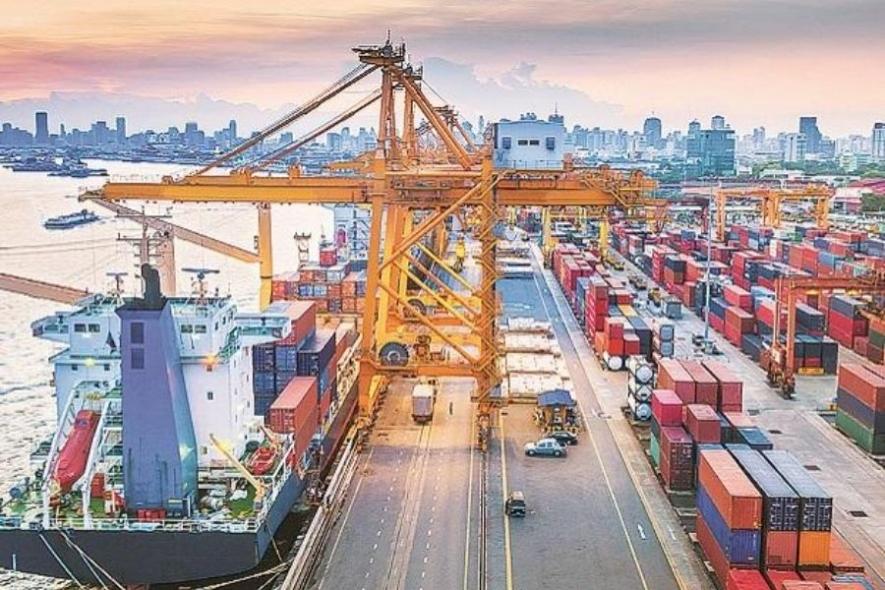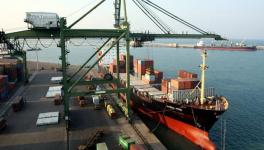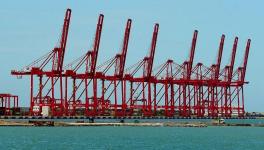Unions Gear up to Resist Threat of Privatisation of Ports As Govt Brings New Law

Representational Image. Image Courtesy: National Business Mirror
Hyderabad: President Ram Nath Kovind gave his assent on February 17 to the Major Port Authorities Bill, 2020, which brings in a wide range of new changes in the country’s maritime sector. The bill, which was enacted on the same day, has been accused to facilitating more privatisation. From March 2 to 4, the Ministry of Ports, Shipping and Waterways (MoPSW) will be organising a second Maritime India Summit (MIS 2021) virtually with an agenda to attract domestic and foreign investments into ports.
V S Padmanabha Raju, General Secretary of the United Ports and Dock Employees Union affiliated to the Centre of Indian Trade Unions (CITU), says that the new act will facilitate the central government to aggressively pursue its policy of privatisation. “With the new legislation, the Port will soon lose its status as ‘Port Trust’ and become ‘Port Authority’. Under Section 53 Clauses (1) & (2) of the act, the central government could issue executive orders to convert the port authorities into companies. Under the Major Port Trust Act 1963, the sale of ports was not allowed but now the central government can go ahead with its plans of privatisation,” said Raju.
The MoPSW has invited 56 maritime nations, except China, to participate in the MIS 2021. Sanjiv Ranjan, secretary of MoPSW, on February 11 said, “A whole new range of opportunities will open up” with the passage of the Major Port Authorities Bill. Prime Minister Narendra Modi will inaugurate the summit in which domestic and foreign corporates will attend.”
However, Raju said, “The forceful passage of the bill despite concerns by employees unions and opposition parties, its enactment and the timing of the maritime summit indicate the central government’s hurry for privatisation in the maritime sector.”
In a press meet on Monday, Visakhapatnam Port Trust (VPT) Chairman K Rama Mohan Rao said that the VPT is signing about 45 Memorandum of Undertakings (MoUs) with investors with an estimated investment of Rs 45,000 crore in port-led industries. Rao said, “The major ports, Shipping Corporation of India, Shipyards, Dredging Corporation of India, Maritime Boards and other maritime agencies are expected to sign MoUs for investments in the maritime sector, including development of port-led industries, during the summit.”
“The provisions given in section 33 to empower the port authorities to raise loans from open market and also foreign financial institutions may finally lead to take over the control of the port management by foreign entities or private parties,” said Raju.
T Narendra Rao, Water Transport Workers Federation of India, said, “The new act is nothing but an attempt to convert the ports into corporate entities, which will make them an easy target of acquisition by corporates or multi-national companies at throw-away prices including its huge lands and severely impact not only the trade but also huge loss of employment opportunities to lakhs of people.”
He added that the various strategic recommendations of the previous Parliamentary Standing
Committees on the Port Sector have not been heeded by the central government. “As a result, the very existence of various major ports is under stake. Many of the newly developed or developing private ports are invested with huge funds for providing basic facilities such as roads, rail connectivity, deep draught channel etc.,” said Rao.
The new law facilitates the public private partnerships in the major ports and provides for the constitution of an adjudicating board which will replace the existing Tariff Authority for Major Ports constituted under the 1963 Act.
The central government has also not heeded the employees’ unions fear of threat to national security with the act. “The major ports like Cochin, Visakhapatnam, Mumbai and Goa are handling defence cargo. If the private operators are given authority to handle such confidential cargo, there may be threat to the national security,” said Raju.
“The 1963 act has been like an obstruction for the Modi government to privatise the Ports. Hence the new law was enacted. It is like a weapon in the hands of the central government to implement privatisation of ports in the country,” said Raju. “The employees and workers have protested numerous times whenever there is a threat of privatisation. We will continue to protest by highlighting the problems with the new act,” he added.
Get the latest reports & analysis with people's perspective on Protests, movements & deep analytical videos, discussions of the current affairs in your Telegram app. Subscribe to NewsClick's Telegram channel & get Real-Time updates on stories, as they get published on our website.
























